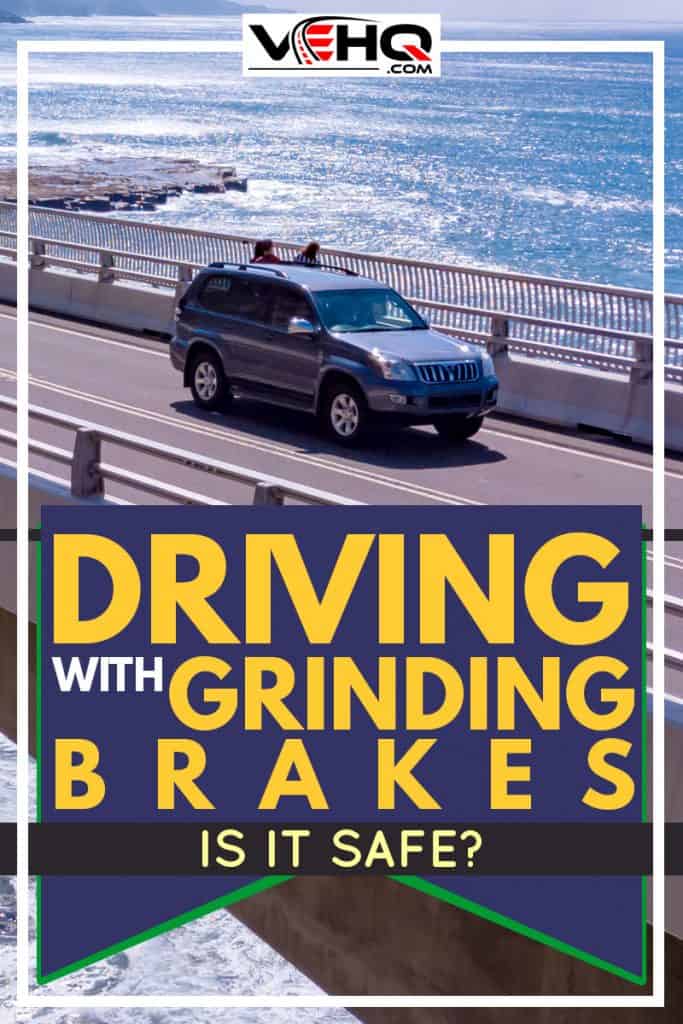 When you bring your vehicle to a stop, hearing a squeal or a grinding noise can be scary – not only for your safety but your pocketbook, as well. Grinding brakes are often the sign of a severe problem or a hint of something to come. And even if your vehicle’s brakes are still seemingly working just fine, it might not always be the best idea to let this problem continue to develop.
When you bring your vehicle to a stop, hearing a squeal or a grinding noise can be scary – not only for your safety but your pocketbook, as well. Grinding brakes are often the sign of a severe problem or a hint of something to come. And even if your vehicle’s brakes are still seemingly working just fine, it might not always be the best idea to let this problem continue to develop.
It’s simply not safe to continue driving on grinding brakes. Brakes are a crucial component of safe driving and not something that you can ignore. If your brakes start to crumble:
- Don’t continue to drive. Stop as soon as it’s safe to do so.
- Get in touch with a certified mechanic for evaluation.
Unless you’re a car pro yourself, trust the pros. Take your car to the dealer you bought it from, or the dealer of your car’s make and model; more than likely, they will know precisely how to proceed and may even keep your parts in stock. Or contact a trusted mechanic who you know will deal honestly with you and that you trust with your car.
Brakes are crucial and used much more while driving than we even realize. For this reason, it’s not something that you can ignore when brakes start to grind and squeal. It could be a danger to you and your loved ones when your vehicle’s brake system malfunctions. Although costly in some cases, the cost is worthwhile to ensure your vehicle is operating safely.
What Happens If You Drive on Bad Brakes?
The problem won’t fix itself, but it will continue to get worse. In some cases, continuing to drive on bad brakes will only increase your repair costs because you will be fixing additional problems, as well.
According to AxleAddict.com, brakes usually begin to grind or squeal because the brake pads have worn down. This causes the rotors to be affected by metal on metal scraping with no braking material in between. If left to itself, this will continue to damage the vehicle resulting in cost for brake pads, rotors, and calipers – and possibly a tow job if your brakes get so bad that there is no stopping safely, making the vehicle unable to be driven.
Preventative maintenance care, which includes replacing the brake pads at the automaker’s recommended mileage, is an excellent way to keep rotors instead of having to replace the entire braking system in one shot. Your vehicle manual should have further information on the manufacturer's recommendations to consider.
If you hear the grinding in the brakes even when you are not pressing on the brake, you may want to consider whether there is a foreign object in the braking system, such as gravel. Hearing the noise when you come to a stop or when you’re driving could indicate different problems.
Bottom line: know your car, and if something sounds suspicious, don’t ignore it. Remember the old saying, “An ounce of prevention is worth a pound of cure.” It’s better to replace slightly worn brake pads by themselves than be forced to replace multiple systems at once and cause potentially catastrophic damage to your vehicle.
Can You Drive A Car With Bad Rotors?

Driving a vehicle with bad rotors is a risk that you should not take. Rotors can become warped, and there is a chance they can even break and completely malfunction, causing the vehicle not to stop.
A broken or cracked rotor could cause the vehicle to improperly steer or jerk, which would ultimately result in losing control of the vehicle entirely. Even if control is maintained, the jerking of the vehicle can damage other steering and suspension components, adding to repair costs.
Your rotors might not be working properly if:
- You have to stomp or press extra hard to get your vehicle to slow down
- General poor braking performance, even under good weather conditions
- Shaking steering wheel or brake pedal vibrations
There’s a lot more at play than just pushing your foot down and slowing your car to a stop. Every system works in tandem with each other, and even if you can mash the pedal to slow yourself, you may be causing damage in different areas that can lead to more costly repairs down the road.
What Happens If I Replace Brake Pads But Not Rotors?
You don’t throw out your shoes just because your shoelaces are worn out; you can get new shoelaces while the shoe itself remains intact. Similarly, depending on your mileage, it may be perfectly fine to replace brake pads and not the rotors.
In general, brake pads will need to be replaced every 10,000-20,000 miles. Much of this is determined by your driving habits or even the environment. Brake pads accumulate wear and tear much faster than other components on your braking system because they are, by nature, worn down every time you brake.
In general, rotors do not need to be replaced until about 70,000 miles. Both pads and rotors may need to be replaced at this mileage point, and as a general rule, they will need to be replaced in pairs. A trusted mechanic will tell you if your rotors are wearing evenly. If they are not, this may wear down pads faster than anticipated.
How Much Does It Cost to Fix Brake Grinding?
Many factors will determine your ultimate cost for brake repair. On average, $500 could be your cost if you are not handy and will be relying on a certified mechanic to do the work for you. Some brake jobs could be much more costly, up to $1,000 or more, while others may be on the cheaper end at $300 or so.
Certainly, if you are handy and can purchase the correct parts at a local auto store or online, you may want to save yourself the cost of labor by installing your brake pads regularly. If you or a trusted friend can disassemble rotors and calipers, that will also save you a bundle. However, many of these braking systems require special tools to access the necessary components. Not every home mechanic will be able to afford such tools to make the job easy or cost-effective.
Costs for fixing your brakes will be determined by:
- Make and model of each vehicle
- Parts needed in stock or special order
- Choice of mechanic
- Whether the original brake issue has caused further damage over time
If you are performing the repairs yourself, refer to your vehicle’s owner manual or be sure to visit the manufacturer’s website. Many auto parts dealers will also maintain extensive databases that can direct you to the right part based on the year, make, and model.
Ultimately, though, you’ll have to decide if you’re ready to take on the challenge. It takes an equal amount of time to wait for a part to arrive at your house as it does to arrive at the mechanic’s, and their work is guaranteed. That being said, labor is an additional cost to be aware of, but it many cases, it is worth the expense.
How Long Can You Go Without Changing Your Brakes?

You can try to stretch it out, but avoiding brake work is a serious chance for your safety. No mechanic can tell you that your brakes are about to “expire” and even mileage estimates are not always a perfect way of timing when brakes will need repairs. It’s not like watching your gas gauge drop from full to empty.
If you stop and go in city traffic, your brakes are going to warrant repairs much faster than someone who drives rural highways and maintains a steady speed. Urban commuters should always consider a more frequent maintenance schedule.
Brakes are affected by many factors, all of which require some vehicles to need repairs sooner and others to last for years and years. Beyond how they’re used, also consider environmental factors like weather, road quality on your regular commute, any unusual trips you may take that are more taxing on your vehicle and any other surprises that may come up behind the wheel.
Taking the time to get your brakes checked at the first few signs of a problem can be the best course of action to not only save you money but also more time in the shop doing more intense repair work. Even stopping in for a regular oil change can help you spot problems before they become worse – mechanics typically perform a multi-point check with doing routine maintenance that can flag warning signs for many drivers.
It can also save you from a tragic crash – a priceless benefit.
Why Are My Brakes Grinding After New Pads?
Some grinding after new pads are installed can be normal, which seems a little contradictory if you already experienced the annoying and sometimes embarrassing situation of grinding brakes. This process is usually short-lived as the pads are bedded. The noise should decrease as you continue to break in the new pads. If the problem persists, consider whether there might be debris on the new pads, such as gravel. A quick run through a car wash that does undercarriage spraying may help loosen this debris.
And if the brake pads were installed on worn rotors, you might still have a problem at hand. The worn rotors will not provide a smooth place for the new pads to wear evenly, resulting in worn brake pads yet again. It’s better to replace both rotors and pads if this is the case.
Don’t Ignore The Problem
Remember, don’t take a break when it comes to fixing your vehicle's braking system.
As with every aspect of your vehicle, brakes need to be well maintained to stay in good working order. If you have any concerns at any time about your car’s ability to operate safely and reliably, take it to a mechanic and have them explain anything that might pose a danger to yourself, your passengers, and, of course, other drivers.
Grinding brakes might be the tip of the iceberg when it comes to signaling a problem with your car. If you catch the problem early, you will undoubtedly save yourself some cash by fixing the issue before it gets too out of control. You could let it go to save money, but you could also seriously be putting yourself and others at risk in the process.
